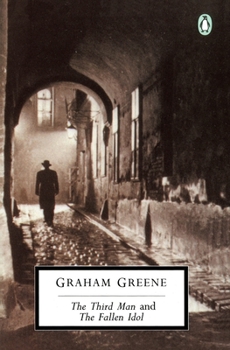The Third Man / The Fallen Idol
Select Format
Select Condition 
Book Overview
Customer Reviews
Rated 4 starsnutritious lit-snack.
Gobbled this twofer down on a transatlantic flight. Third Man is indeed inferior to the film, which Graham all but concedes upfront, introducing it as a workmanlike story written as a sketch for the movie. You just can't get Orson Welles' screen magnetism, Reed's elegant canted angles or the kickass zither from the page, and the movie's ending is just worlds better. But a good read nonetheless. Fallen Idol is the real gem...
1Report
Rated 5 starsTwo sides of Greene: One good and another great
As Graham Greene admits in the preface of the novella "The Third Man", this story 'was never written to be read but only to be seen'. When invite by director Carol Reed to write a screenplay, the British novelist decided to write a short story first and then develop the script. As he confess, it is too hard to write a movie without having worked on the story previously, because the movie depends also on characterization, mood...
1Report
Rated 4 starsTwo dark, ironic stories which led to early noir films.
The Third Man, written originally as the outline for the screenplay of Carol Reed's famous 1949 film of the same name, is set in occupied Vienna just after World War II. The sectors established by the conquering British, Americans, French, and Russians contribute to an atmosphere of tension and mystery, and an almost palpable aura of menace as residents and visitors alike must deal with four different governments, four sets...
1Report
Rated 4 starsGraham Greene tells story with rich inner thoughts
On the backcover of the book:THE THIRD MANRollo Martins is invited by his school-friend hero, Harry Lime, to post-war Vienna, 'a smashed dreary city' occupied by four powers...Everyone has a racket, but Martins learns that Lime 'was about the worst racketeer who ever made a dirty living'. What's more, LIme has just been killed - by accident? The truth is almost more than Martins can stand...THE FALLEN IDOLPhilip is a small...
0Report














